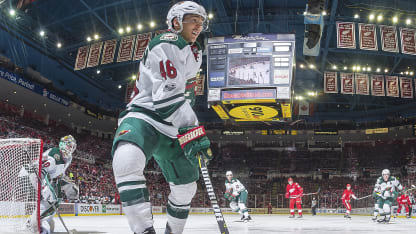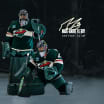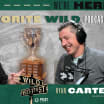ST. PAUL -- In the five weeks since the Wild was eliminated from the postseason, a whole bunch of playoff hockey has been played.
Almost none of it was witnessed by Wild defenseman Jared Spurgeon, who has been busy with, among other things, adjusting to life as a father of three.
Without Looking Back, Spurgeon Prepares for New Season
Wild defenseman hopes career ascent continues in 2017-18

Even without another little one in his life, watching playoff hockey in a season where the Wild appeared destined to still be playing has proven difficult for Spurgeon.
"It makes you angry," Spurgeon said. "It's still tough to swallow, to know that you could still be in a position to win a Cup with the team that we had this year. We're all very confident in ourselves, and then for it to end the way it did and how fast it happened ... a blink of the eye and it was done. I think as a group, we expected to go a lot father than that.
"To have it end like that makes it hurt a lot more."
What makes the sting worse was the Wild's performance once it got to the postseason. Even though Minnesota bowed out in just five games to the St. Louis Blues, the Wild played well, owning major advantages in a number of important possession categories.
It wasn't as though the team was simply overmatched and lost to a clearly superior team.
But for that week and a half, St. Louis found a way when the chips were down.
"They found a way to win and we didn't," Spurgeon said. "You can play your best game, and if you don't find a way to put that goal in or block that shot at the right time, it's not going to matter. I think that's a learning thing for us all; no matter how you feel, it's not going to feel good at the end if you don't achieve your goal."
Franchise player
Spurgeon's NHL career is the definition of the the old idiom, "One man's trash is another man's treasure."
The New York Islanders selected Spurgeon in the 2008 NHL Draft, but elected not to sign him out of the Western Hockey League.
Spurgeon had a few options, but chose Minnesota, based largely on the positive words he got from his older brother, Tyler, who played for the Pittsburgh Penguins organization when current Wild General Manager Chuck Fletcher was an assistant there, as well as former Wild defenseman Justin Falk, a junior teammate of Spurgeon's with the Spokane Chiefs.
Strong performances in development camp and training camp put him on the Wild's radar before an initial call-up to the NHL in 2010 gave him an opportunity.
Save for one final trip to the American Hockey League to assist the Houston Aeros during a Calder Cup run in 2011, Spurgeon has never returned to the minors. Now, with the NHL expanding to Las Vegas and each of the 30 teams preparing to lose a player to the Golden Knights for nothing, Spurgeon can sit back.
While nothing has been promised to him, Spurgeon is expected to be one of three defensemen the Wild will put on their "protected" list, meaning Vegas cannot select him in the expansion draft on June 21.
That
climb from one-time outcast to franchise cornerstone
has not been lost on Spurgeon.
"It's nice to have that confidence put in you, that's for sure," Spurgeon said. "Coming into the year, you knew what was sort of happening with the [expansion] team, but you never really knew the direction of the [Wild] organization."
Still, Spurgeon said he will be sad to see a teammate go. But as one of the NHL's deeper teams, it's the price the Wild must pay.
"That's the one downfall of having a great team is you're not going to be able to [keep everyone]," Spurgeon said. "No matter what you do, you're going to lose a great player and a great person. It's going to be tough to see someone go from our team, because we have a tight-knit group."
Steady climb
Statistically, Spurgeon has improved each season he's been in the NHL, culminating this past season in a career-high 38 points.
While a defenseman's value cannot be judged entirely by his offensive output, Wild coach Bruce Boudreau consistently praised Spurgeon's play while others commented routinely on how rarely Spurgeon had an off night.
Even in games when the team didn't have its best game, Spurgeon was often playing well.
His plus-33 was tied for third-best in the NHL this season. It was also third-best on the Wild, after League leaders Jason Zucker and Ryan Suter each finished plus-34.
Boudreau's trust in Spurgeon was best displayed in how often the veteran coach deployed him: He skated a career-high 24:02 of ice time per game, more than a minute more than the 22:41 Spurgeon averaged in 2015-16.
Now 27 years old and entering his prime, Spurgeon said he hopes to fine-tune some areas of his game to bring it to an even higher level.
"You always have to want to get better at everything," Spurgeon said. "Skating in today's game is huge, so improving that every year is big. Even if it's working on little things that skating coaches have, that helps out a lot."
If there is one area of Spurgeon's game he wants to get better at, it's finding a way to get shots to the net.
Despite scoring 10 goals (one shy of his career high) and scoring 38 points (nine points better than his previous career best), Spurgeon's productivity on the power play decreased this season.
After scoring five goals on the man advantage in 2015-16 -- nearly half his season total -- just one of his 10 this year came with the extra attacker. Five of his 38 points came on the power play, as well (compared to 13 of 29 the year before).
It's a lesson he and his teammates learned the hard way during the postseason.
"You saw it in the playoffs this year, with how many shots got blocked," Spurgeon said. "If you can just find a way to get a puck through, get some traffic in front of the net, he can get a tip on it or a rebound. It creates a lot of havoc for the other team."
As a defenseman, Spurgeon said he will also continue to work on perfecting his positioning. As he's matured and gotten older, it's an aspect of his game that has also continually improved.
"I know my game better now," he said. "Knowing the game and the teams you're playing against, that helps out a lot."
It also helps playing with a guy like Ryan Suter, who has mastered the ability to use positioning and angles, among other subtle aspects of his game, to increase production while seemingly using less energy.
That formula allows him to play big minutes in important spots.
"Those little things are huge," Spurgeon said. "Watching Ryan and having him talking to us over the years, it's the little things. Whether it's making a tape-to-tape pass or rimming the puck to get it to a guy, not trying to be fancy with it.
"When you're younger, you're always thinking you're going to get sent down or traded. Now, you come to terms with the fact that it's a business, and that might happen, but you just have to play your best and do you best for the team so that you're confident and not worrying about that stuff."


















